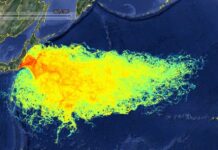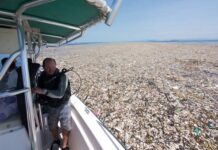A young whale carcass that washed up in in the Philippines has been found to have died after consuming about 88 pounds (40 kilograms) of plastic bags, in the latest horrifying sign of the extent to which our oceans have become polluted with plastic waste.
The Cuvier’s beaked whale was discovered last Friday beached in the highly-populated Davao Region on the Philippine island of Mindanao before being subjected to an autopsy by Darrel Blatchley, the founder of the D’Bone Collector museum, according to local ABS-CBN News.
Blatchley found that the whale’s belly had been stuffed with various pieces of plastic garbage, including shopping bags, yet he told CNN that the whale died “showing signs of being emaciated and dehydration” as well as “vomiting blood before it died.”
The sheer volume of plastic that the whale ingested caused it to suffer a case of “gastric shock”–ultimately leading to the sea mammal’s death by dehydration and starvation. The whale–like other aquatic mammals including dolphins–belongs to the family of cetaceans, which obtain water from the food they eat rather than the water in the ocean.
In an angry statement posted to their Facebook statement, the museum detailed the trash discovered in the whale’s stomach:
“40 kilos of plastic bags. Including 16 rice sacks. 4 banana plantation style bags and multiple shopping bags. A full list of the plastic items will follow in the next few days. This whale had the most plastic we have ever seen in a whale. It’s disgusting.”
“Action must be taken by the government against those who continue to treat the waterways and ocean as dumpsters,” the museum added.
Last June, a small pilot whale died in southern Thailand after it swallowed over 80 plastic bags and was discovered on the brink of death in a canal. When the whale was being rescued it was vomiting up bags in a desperate attempt to survive.
And this year alone, three whales and dolphins were found dead in the Gulf of Davao after ingesting plastic waste.
Plastics and microplastics have inundated the world’s oceans and water supplies, leaching carcinogenic toxins and chemicals into the marine environment, with plastic drink containers trapping and confining–and ultimately killing–small marine organisms and fish, while larger sea creatures are frequently discovered dead with bellies full of garbage.
According to a report prepared for the 2016 World Economic Forum in Davos, Switzerland, by 2050 it is estimated that the plastic waste in the ocean will outweigh all fish.
Conservationists have urged governments and corporations alike to drastically reduce their use of single-use plastics and curtail dumping into oceans.
World Animal Protection campaigner Peter Kemple Hardy told CNN that more work must be done to seek “global solutions,” explaining:
“Hundreds of thousands of whales, dolphins, seals and turtles are killed by ocean plastic pollution every year, including single-use plastics and abandoned plastic gear from the fishing industry.”
Likewise, Blatchley has made an appeal to the public to halt the thoughtless disposal of plastic waste into Philippine waterways. Blatchley told ABS-CBN:
“Every single river, every single canal goes directly to the ocean. So everything from small whales and dolphins, even the sea turtles are affected by this, as well as humans. We are eating the food that comes out of that ocean. So we’re basically throwing our own garbage into our food source.”






